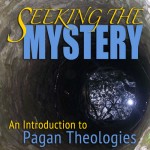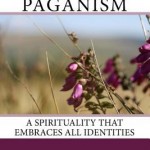Paganism is focused on practice rather than on belief. Ritual – whether we perform the rituals of a particular tradition, innovate our own, or a bit of both – is at the center of most Pagans’ religious lives. We build altars, sing chants, leave offerings, drum, and dance. But the ritual of reciting a creed, a doctrinal statement of belief, is notably absent. Pagans may recite liturgy together, but none of it begins with “I believe.”
Unfortunately, in our attempts to distinguish ourselves from the strongly Protestant Christian culture of the United States, we’ve rejected more than the idea of creed. Even the idea of having beliefs –and of having theology, a framework for discussing beliefs – has become suspect. And in refusing to acknowledge belief as an intrinsic part of practice, we’ve dulled our understanding of ourselves. Even worse, our resistance to the idea of building Pagan theologies may have slowed the development of a new, distinctively Pagan intellectual culture.
I want to help change all that.
So let’s begin with a simple question: In a Pagan context, what is theology?
For me, theology is a vocabulary and a framework for thinking about spiritual issues. It also the process of doing that thinking – of framing the questions and exploring their answers. Questions like, “What is the nature of the Gods?”, “How can humans have meaningful relationships with the land on which they live?”, or “How do we understand death?” are all theological in nature.
Because Paganism is so highly individualistic, Pagan theology is inherently personal. As Sam Webster wrote recently of liberal theology (and I think most Pagan theology fits that definition), much of what theologians do is develop spiritually pressing, provocative questions, as well as some potential methods for answering them. The answers themselves come from individuals and their communities, all in dialogue with each other.
Let me be clear: theology need not be a practice where an educated elite creates rigid systems of belief for the masses to embrace. It is not the same as doctrine (a codified system of beliefs), nor dogma (beliefs declared by a religious group to be absolutely true). Rather, it is an ongoing, cyclic process: through practice, we have religious experiences and come to know ourselves and divinity (or, perhaps, divinity in ourselves). Our experiences resulting from practice inform our beliefs about the world, which in turn shape our practice.
The discipline of theology describes this integrated system of practice and belief. When we share our ideas about the nature of the Gods, discovered through practice, we are doing theology. When we consider why one ritual is more spiritually effective than another, we are doing theology. When we discuss the nature of the human soul, the spiritual basis of gender, or the necessary foundations of religious community, we are doing theology. Theology, at the core, is an expression of our holiest experiences and our deepest knowing, integrated with the clarity and eloquence of the rational mind.
Many Pagans do theology all the time. We just haven’t been calling what we do “theology,” nor have we been consistently doing it with all the depth or complexity we’re capable of.
Without a commitment to developing theologies with a sophisticated vocabulary and continuous traditions of thought, Pagans have a tendency to reinvent the wheel. Multiple communities have the same discussions about the role of offerings in ritual, for instance, but those communities do not have significant contact, and little may be written down. Innovations in ritual appear, are briefly spread, and then are lost, only to be innovated again with much fanfare in a different community. Different practitioners write articles about the nature of the gods, sometimes making the same arguments, but without any awareness of their fellow writers. It is difficult to stand on the shoulders of giants when we don’t know who they are.
The Internet, happily, is changing this situation, as is the ease of self-publishing. We are not isolated in our local communities or individual traditions the way we once were, and niche books – books that larger publishers won’t buy, because their intended audience is too small – are now widely available. We are undertaking the next step in our movement’s development: building theological traditions through dialogue.
Many of us have begun to publish formal or semi-formal Pagan theologies, in book or blog form. One of the purposes of my recent book is to provide an overview of recent, theologically innovative Pagan writing, as well as to present entry-level vocabulary for those who want to contribute to Pagan theological discussion. But the next step now is not just to publish theological work, but to read each other’s work, and read it deeply.
It’s time to study contemporary Pagan and related theologies with the same seriousness that other religions give their theological traditions.
It’s time to teach and take classes, to debate in an atmosphere of collaboration and support, and to push each other towards ever-deepening connection with being, toward ever-deepening truths.
It’s time for Pagans to take their beliefs as seriously as they do their practices, and to affirm that thinking is as important to being human as feeling.
We are passionate people, deeply committed to our practices and our relationships. Pagan theology can give us an intellectual framework to support and sustain that practice.
Come: with warm bodies and full hearts, let us reason together.
















